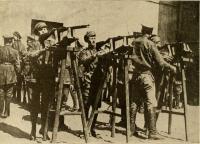-
Comparing U.S. deaths from terrorism vs. gun violence
The number of Americans killed in acts of terrorism – both on U.S. soil and abroad — between 2001 and 2014 is 3,412 (including the victims of the 9/11 attacks). During the same period, 440,095 people died by firearms on U.S. soil (homicides, accidents, and suicides). In 2014, for every one American killed by an act of terrorism in the United States or abroad, 1,049 Americans died in the United States because of guns.
-
-
Syrian rebel leader: Assad is the main enemy, not Israel
Mohammed Alloush, the leader of a coalition of Sunni rebels fighting against the regime of Syrian President Bashar al-Assad, said his group, which includes Islamists, has no desire to go to war with Israel. His attitude reflects the privately held positions of many Sunni Arab governments. Alloush’s statements also show that Israel has purchased some goodwill among the Syrian opposition. He told a Western reporter that Israel’s treatment of Syrians fighters and civilians who come to the border seeking medical attention is an important humanitarian gesture.
-
-
Why Colombia voted “no” to peace with FARC

It seemed like a done deal. After sixty years of fighting, three years of detailed negotiations, and a peace agreement signed in front of the head of the United Nations, the horrific conflict between the Colombian state and the Marxist Fuerzas Armadas de Colombia (FARC) finally seemed to be over. The peace process looked set to be a model for future negotiations around the world; all it needed was public approval. And then, in the referendum that was meant to finish the job, 50.24 percent of voters rejected the agreement – with fewer than 40 percent even showing up. It’s hard to know what happens next: more negotiations, another offer, reinvigorated conflict. The already weakened FARC might yet fragment, making another deal less robust; the government might shift back to the right, possibly heralding a return to a war fought through paramilitary proxies. Whatever happens, Colombia needs to find a way for all its people to discuss their own war – and their own peace – in a way that validates their experiences and does not escalate the violence further.
-
-
The 52-year war in Colombia: The numbers
The toll of the 52-year was in Colombia: 267,000 killed; 6.7 million people forcibly displaced; 46,386 victims of forced disappearance; 29,622 kidnapped; 8,022 children soldiers used both by FARC and right-wing paramilitary groups; 4,392 victims of extrajudicial execution by the government security forces
-
-
ISIS regards battle for Dabiq as an apocalyptic showdown of Muslim and Christian armies
This may not be the end of the ISIS caliphate – which military experts say will occur sometime during the second half of 2017 – but the Islamist organization views the coming battle for the town of Dabiq in apocalyptic terms nonetheless. U.S.-backed Syrian opposition forces and Turkish military units are within forty-eight hours of reaching the ISIS-controlled Dabiq, which jihadists regard as the preordained site of the final apocalyptic battle between Muslims and Christians.
-
-
Europe facing “generation-long struggle” with returning battle-hardened jihadists

European security officials say that Europe faces a generation-long struggle to deal with thousands of battle-hardened Islamic jihadists returning as the ISIS caliphate starts to collapse. Experts say that he cumulative effects of the relentless military campaign by the U.S.-led coalition would finish off the so-called caliphate by the end of 2017 at the latest, if not sooner. The coalition’s military campaign has so far killed between 45,000 and 50,000 ISIS fighters, many of them foreigners, but an estimated 3,000 European fighters are still fighting in ISIS ranks. European security officials believe that the imminent fall of Mosul, Iraq’s second largest city, would signal the beginning of the end of the caliphate, resulting in many of the European ISIS fighters returning to their home countries.
-
-
Obama explains why he does not use the term “Islamic terrorism”
Talking at a Wednesday CNN presidential town hall event moderated by Jake Tapper, President Barack Obama, in response to a question by a Gold Star mother, has defended his reluctance to use the term “Islamic” terrorism when referring to the atrocities committed by ISIS, al Qaeda, and other extremist groups. “If you had an organization that was going around killing and blowing people up and said, ‘We’re on the vanguard of Christianity.’ As a Christian, I’m not going to let them claim my religion and say, ‘you’re killing for Christ.’ I would say, that’s ridiculous,” Obama said.
-
-
HHS sponsors inhaled chlorine antidote for chemical terrorism preparedness

Chlorine gas is a widely available industrial chemical with catastrophic consequences in industrial accidents. chlorine gas has been used as a weapon, for the first time in the First World War and repeatedly in the recent Syrian civil war. Currently, there is no specific antidote for lung injuries caused by chlorine exposure, and treatment has been limited supportive care. The first potential antidote to treat the life-threatening effects of chlorine inhalation, a potential terrorism threat, will advance in development under a contract between the U.S. Department of Health and Human Services’ (HHS) Office of the Assistant Secretary for Preparedness and Response (ASPR) and Radikal Therapeutics, Inc. of Beverly, Massachusetts.
-
-
Countering enemy IEDs in culverts
Culverts are creeks or streams that run under roads to prevent flooding, and that terrorists often use these areas to kill soldiers. The Joint Improvised-threat Defeat Agency (JIDA) challenge, held 13-21 September at Fort Benning, tested industry vendor equipment from around the United States in order to counter enemy improvised explosive devices (IEDs) in culverts.
-
-
Congress overrides Obama's veto of law allowing 9/11 families to sue Saudi Arabia
The Congress on Wednesday voted overwhelmingly to override President Barack Obama’s veto of a bill which would allow families of 9/11 to sue Saudi Arabia, seeking damages for the 9/11 attacks. The Senate voted 97 to 1 to override the president’s veto, and the House voted 348 to 77 to do so. This is the first time Congress has successfully overruled a veto during Obama’s tenure.
-
-
JASTA exposes British soldiers, intelligence operatives to prosecution: U.K.
Britain has expressed concerns to the United States that the Justice against Sponsors of Terrorism Act (JASTA) legislation which President Barack Obama had vetoed but which has become law after Congress on Wednesday overrode his veto, could lead to the prosecution of British military and intelligence personnel in American courts – and by hostile regimes around the world. U.K. intelligence and security agencies, MI6 and MI5, have warned about the ramifications of JASTA, as it exposes British personnel to lawsuits by American lawyers attempting to prove that U.K.-based jihadists have been involved in terror plots against U.S. targets. Even more worrisome is the fact that the weakening of sovereign immunity could result in U.K. military and intelligence personnel facing legal action from hostile states.
-
-
ISIS's imminent defeat will create “terrorist diaspora sometime in the next two to five years”: Comey
FBI director James Comey on Tuesday warned that the increasing success of the military campaign against ISIS in Syria and Iraq carries an ominous downside: a wave of terrorist fighters who will spread across the globe as the group loses control of its territory on the ground. “They will not all die on the battlefield in Syria and Iraq. There will be a terrorist diaspora sometime in the next two to five years like we’ve never seen before.”
-
-
Sudan used chemical weapons against civilians in Darfur
An Amnesty International investigation has gathered evidence of the repeated use of what are believed to be chemical weapons against civilians, including very young children, by Sudanese government forces in one of the most remote regions of Darfur over the past eight months. The investigators, using satellite imagery, more than 200 in-depth interviews with survivors, and expert analysis of dozens of images showing babies and young children with chemical weapons-related injuries, the investigation indicates that at least thirty likely chemical attacks have taken place in the Jebel Marra area of Darfur since January 2016. The most recent was on 9 September 2016.
-
-
A first: ICC sentences Islamist to nine years for cultural destruction in Timbuktu
The International Criminal Court sentenced an Islamist militant to nine years in jail for ordering members of the Islamist Ansar Dine group in northern Mali to destroy historic shrines and mausoleums in Timbuktu, and burn hundreds of ancient books. The destruction took place in between April and December 2012, when the Islamists controlled the break-away northern Mali – which they called the Republic of Azawad – after chasing the Mali army away. A three-judge panel in The Hague sentenced Ahmad al-Faqi al-Mahdiin the first-ever case of an individual being charged with war crimes solely for cultural destruction.
-
-
Judge questions whether Facebook is doing enough to deter terrorists from using its platform
A federal judge harshly criticized Facebook, admonishing the social media giant for not be doing enough to deter terrorists from using its platform. U.S. District Judge Nicholas Garaufis in Brooklyn, New York, also accused Kirkland & Ellis LLP, Facebook’s lawyers — who had sent a first-year associate to a hearing — of not taking seriously lawsuits which touch on important issues such as international terrorism and the murder of innocents. “I think it is outrageous, irresponsible, and insulting,” Garaufis told the attorney. The judge ordered the law firm to send a more senior lawyer to the next hearing on 28 September because he wanted to “talk to someone who talks to senior management at Facebook.”
-
- All
- Regional
- Water
- Biometrics
- Borders/Immig
- Business
- Cybersecurity
- Detection
- Disasters
- Government
- Infrastructure
- International
- Public health
- Public Safety
- Communication interoperabillity
- Emergency services
- Emergency medical services
- Fire
- First response
- IEDs
- Law Enforcement
- Law Enforcement Technology
- Military technology
- Nonlethal weapons
- Nuclear weapons
- Personal protection equipment
- Police
- Notification /alert systems
- Situational awareness
- Weapons systems
- Sci-Tech
- Sector Reports
- Surveillance
- Transportation
Advertising & Marketing: advertise@newswirepubs.com
Editorial: editor@newswirepubs.com
General: info@newswirepubs.com
2010-2011 © News Wire Publications, LLC News Wire Publications, LLC
220 Old Country Road | Suite 200 | Mineola | New York | 11501
Permissions and Policies
Editorial: editor@newswirepubs.com
General: info@newswirepubs.com
2010-2011 © News Wire Publications, LLC News Wire Publications, LLC
220 Old Country Road | Suite 200 | Mineola | New York | 11501
Permissions and Policies
